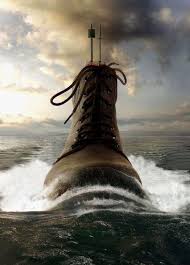
In a great scene from "Das Boot," the German movie about the horrors of submarining in World War II that was perhaps the most effective anti-war movie ever made, the captain and crew are trapped on the bottom of the Mediterranean near the Straits of Gibraltar. The submarine has been damaged by Allied fire, and the only chance for survival rests on the ability of the strange, selpulchral, hollow-eyed chief engineer who is attempting to jerry-rig enough battery power to blow the ballast tanks so Das Boot will rise. The crew sits quietly waiting while he works; the ship is running low on oxygen, the tension is overpowering, and they all know they have one chance. If the power surge fails, they're doomed to suffocate on the bottom of the sea (the fate, in fact, of most German submariners during the war).
While we go about our business here in the Heimatland, Captain Obama and his chief financial engineers are rigging up a similarly desperate fix. If you look at the figures for growth in the national debt for the period ending September 30, 2008, you will note that the number increased by $1 trillion, the largest annual leap (by about a factor of 2) in U.S. history. As we know, however, we ain't seen nothin' yet. All the subsequent bailouts and the impending recovery jolt of $800 billion are surely going to result in a measured increase this September in the two to three trillion dollar range. It goes without saying the United States does not have this kind of cash lying around.
So it must be borrowed. Sales of Treasury bills have been brisk over the last year, even at highly depressed interest rates, because there's nowhere else for money to go. Money pouring out of the equities market has been redirected into these zero-growth instruments on the theory at least they're "safe." But supposing that the deficit really does go to $2 trillion or above: with the money already squeezed out of the stock market, are there enough sovereign wealth funds and individual investors around to buy up this much debt?
The foreign creditors, such as central banks in Saudi Arabia, the Gulf States, Japan and China, have reliably recylced trade surplus dollars on the order of $700 billion per year. While this is nice as a historical fact, there are two problems going forward. First, the USA is not such a reliable trading partner anymore because the American consumer is cash-strapped. That $700 B figure is probably shrinking as we virtually speak. The second is that a donation on the order of $700 billion, even if possible, is not nearly enough.
The neat trick employed by the fulminating Congresspeople at hearings and Mike-Stand Moments is to talk angrily about the "taxpayers" and how they're being robbed by the necessity of bailing out all the banksters. It's true that the "taxpayers" have been asked historically to pay interest on all this money borrowed, but we're obviously losing contact with any ability ever to pay back the principal amount. The national debt is now approaching one year's total GDP for the United States. We're not going to shake that money out of our sleeve. All the taxpayers can do is provide the cash flow on which more massive borrowing can be based.
So what happens if the funding sources simply aren't there? If the money can't be borrowed because there just aren't enough dollars lying around the world in the hands of people willing to buy Treasury notes? What then? I think I can say that I have never heard a politician of either party, or the Chairman of the Federal Reserve, or the Treasury Secretary, or even Paul Krugman, address this question directly (of course, in a recent column Prof. Krugman opined that budget deficits weren't that "big a deal, because it's basically money we owe ourselves," a head-scratcher if I ever heard one. I think Wen Jiabao would answer, "Speak for yourself, Caucasian.")
President O, who would really like to be "transparent" (I do believe that), probably wrestles with this conundrum every night. The limited intellect of his predecessor shielded Bush from similar anguish. Should Obama lay it out, that maybe there just isn't enough money to make this thing work, that we can "appropriate" all we want, but if you ain't got it, you ain't got it?
I think it would be good if someone just laid it out for once. At least describe the risk of insolvency so the populace would know where we're at. The captain of Das Boot told his men ahead of time that they had one shot at clearing the ballast tanks. They knew what they were up against. So that when the sub began to lift up off the bottom, ever so slowly at first, they knew what they had escaped.



No comments:
Post a Comment